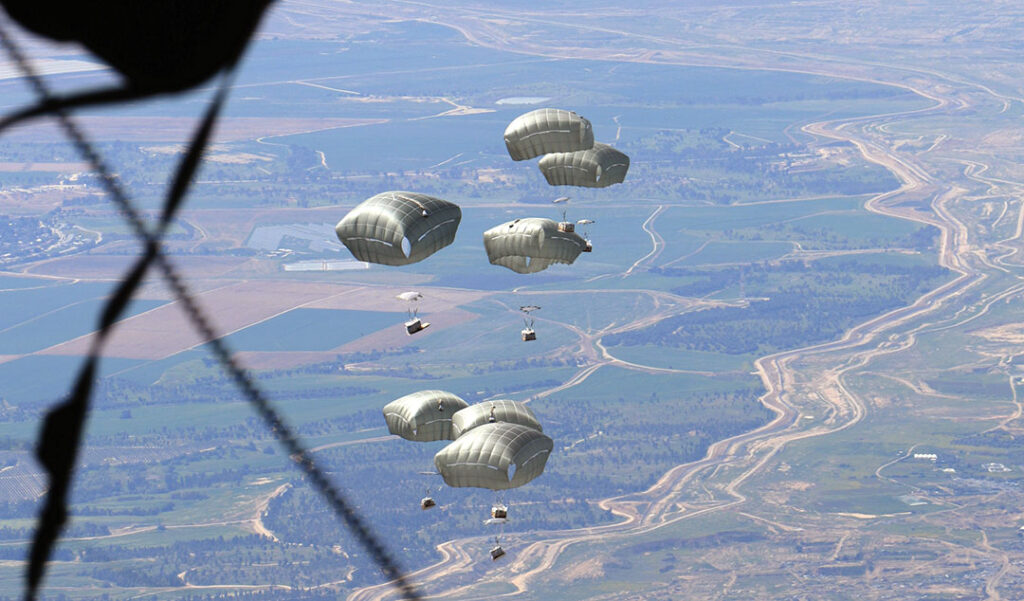BRIG. GEN. MUSTAFA ABDUL HALIM AL-HIYARI, DIRECTOR OF MILITARY MEDIA, JORDAN ARMED FORCES-ARAB ARMY
PHOTOS BY JORDAN ARMED FORCES
From Day 1 of the war in Gaza, Jordan has worked tirelessly to secure a cease-fire, protect civilians and provide humanitarian aid to the Gaza Strip. This is in addition to calls by His Majesty King Abdullah II ibn Al Hussein to find a political framework for a comprehensive resolution and establish an independent state based on the two-state solution. This is where the Jordan Armed Forces-Arab Army comes into play by upholding the official position and supporting humanitarian efforts in the Gaza Strip to ease human suffering under these difficult circumstances.
Jordanian military field hospitals, with their teams of medical specialists, stand at the forefront of providing vital medical care. This includes a surgical unit that was set up in Ramallah along with another unit in Jenin. In 2009, Jordan established the first Arab hospital in the Gaza Strip, which has since received 2 million patients.
As the health situation deteriorated with the continuation of the war, the Jordan Armed Forces sent Special Military Field Hospital 2/South Gaza Strip to the town of Khan Yunis. In addition to this, the Nablus Jordanian Field Hospital was assembled and deployed to ease the burden on other hospitals. The Jordan Armed Forces, working with the Jordan Hashemite Charity Organization and the Ministry of Foreign and Expatriate Affairs, also sent medical, food, and other relief supplies via an air bridge established between Marka Military Airport in Jordan and Al-Arish Airport in the brotherly Republic of Egypt.

As a result of the difficulty of delivering aid through land crossings, the Jordan Armed Forces began airdrops of medical and relief supplies to Jordanian field hospitals in the Gaza Strip to support and develop their capabilities and enhance the ability of medical staff to provide medical services. This has eased the suffering of the wounded and injured amid the difficult conditions they are facing.
These operations expanded to include deliveries of humanitarian aid directly to the civilian population in Gaza. Airdrops were conducted throughout Gaza to reach all civilians who need aid and to alleviate the burden of a war. Airdrops were increased during the holy month of Ramadan as the Jordan Armed Forces worked alongside many other countries to intensify airdrop operations.
Airdrop operations are an important part of a strategy to provide humanitarian aid to areas afflicted by conflicts and disasters. These operations are challenging and complex. They are often hindered by adverse weather like high winds, fog and storms. Locating landing sites requires precision and timing. The deployment of costly fuel and personnel are among the logistical challenges. Despite all that, Jordan’s airdrops of food and medical supplies to Gaza caught the attention of the whole world, and the skillful Jordanian operations have provided desperately needed food and medicine to trapped civilians.

These operations were not achieved by Jordan alone, but with the participation of the many countries that had difficulties sending aid by land and consequently turned to Jordan to transport aid. In the spirit of joint cooperation, and in coordination with the Jordan Armed Forces-Arab Army, the U.S. is contributing to humanitarian airdrops in the Gaza Strip.
Jordan Armed Forces airdrop operations provide humanitarian aid to Gaza using C-130 transport planes, which can carry large loads of material to be dropped by parachute. Airdrops have many advantages. They can succeed in the absence of functioning infrastructure or when civilians are trapped in locations inaccessible to humanitarian aid organizations. Airdrops, howev-er, are considered a last resort given their high cost compared to land transport, the hazards of flying over conflict zones and the risk of injury if heavy loads land in the wrong place.
It should be mentioned that on Christmas Eve 2023, the Jordan Armed Forces-Arab Army carried out an airdrop to help people besieged in Deir Al-Lateen Catholic Church in the Hay Al-Zaytoun district in northern Gaza. A Royal Jordanian Air Force plane dropped humanitarian supplies and food to 800 Christian residents of Gaza who were taking refuge in the church. They were suffering from critical shortages of food and other essentials and living in dire conditions. This was a message of love on Christmas Eve from Jordan to the church that was providing a haven for Christians.

As the war continues and the humanitarian crisis worsens, more than a half million Gazans are one step away from facing starvation, according to U.N. estimates. One in six children under the age of 2 in northern Gaza faces severe malnutrition.
Although not a permanent solution to delivering aid, the Jordan Armed Forces airdrops, in cooperation with friendly and brotherly states, continue to provide medical and humanitarian aid to alleviate the human suffering of the victims of war.

